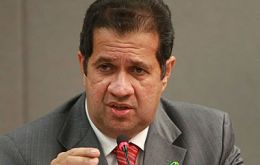MercoPress. South Atlantic News Agency
Brazil
-
Saturday, August 21st 2010 - 13:42 UTC
Lula da Silva recommends Dilma to think and act as the “mother of the poor”

President Lula da Silva compared candidate Dilma Rousseff to a mother and recommended, if elected, to always think about the poor. Lula da Silva and Ms Rousseff participated in a political rally Friday night in the metropolitan Sao Paulo.
-
Friday, August 20th 2010 - 02:46 UTC
Slower job creation and lower inflation indicate Brazilian economy cooling

Brazil reported the third straight month of slower job creation in July, reflecting the slowdown of the economy in the second quarter after a massive 9% year-on-year growth in the first quarter of the year. Traders say this increases the likelihood central bank policy makers may leave interest rates unchanged in their next meeting.
-
Friday, August 20th 2010 - 02:32 UTC
Brazilian presidential candidate “completely cured” of the lymphoma

The Brazilian presidential candidate for the Workers’ Party ruling coalition, Dilma Rousseff underwent this week a battery of exams and tests at Sao Paulo’s most advanced hospital confirming she has overcome the lymphoma detected last year.
-
Friday, August 20th 2010 - 02:20 UTC
Brazil overtakes Canada and Spain to become world’s eighth largest economy

Brazil has overtaken Canada and Spain to become the world’s eighth largest economy, relegating Spain to ninth place, Spanish newspaper Expansión reported Wednesday.
-
Thursday, August 19th 2010 - 06:11 UTC
First on-line presidential hopefuls debate attracts 50 million Brazilians

Three major candidates for the Brazilian presidency joined the first online debate Wednesday, which was followed by an estimated 50 million people and less than two months before ballot day, October 3.
-
Thursday, August 19th 2010 - 03:09 UTC
Brazil wealthiest man pays 285.000 USD for Lula da Silva’s inauguration suit

Brazil’s wealthiest man, Eike Batista paid the equivalent of 285.000 US dollars for the inauguration suit of President Lula da Silva when he first took office in January 2002. The sale was part of a charity auction to collect funds for a famous Sao Paulo favela (shanty town) that goes by the name of Paraisopolis, (Paradise City).
-
Wednesday, August 18th 2010 - 05:12 UTC
Brazil’s Dilma Rousseff closer to winning in the first round

Brazilian presidential candidate Dilma Rousseff widened her lead to 11 percentage points over opposition candidate Jose Serra, putting her in position to win in the first round of the October election, according to an Ibope poll published by the TV Globo network.
-
Wednesday, August 18th 2010 - 05:02 UTC
Brazilian journalists challenge law which forbids satirizing candidates

An election law from the era of Brazil's dictatorship past which forbids making fun of candidates has caused concern ahead of the countries October 3 presidential election and a possible run-off at the end of October.
-
Tuesday, August 17th 2010 - 09:33 UTC
Poll confirms Brazilian incumbent presidential candidate Rousseff 11 points lead

Brazilian presidential candidate Dilma Rousseff has an 11 percentage point lead over former Sao Paulo Governor Jose Serra before the country’s October elections, according to an Ibope poll published by TV Globo network and O Estado do Sao Paulo newspaper.
-
Tuesday, August 17th 2010 - 09:22 UTC
Petrobras admits ‘minor’ conservation problems on several oil platforms

Brazil's government managed oil giant Petrobras CEO admitted Monday that minor conservation problems exist on some of the company's platforms in the Campos Basin, off the country's south-eastern coast.
